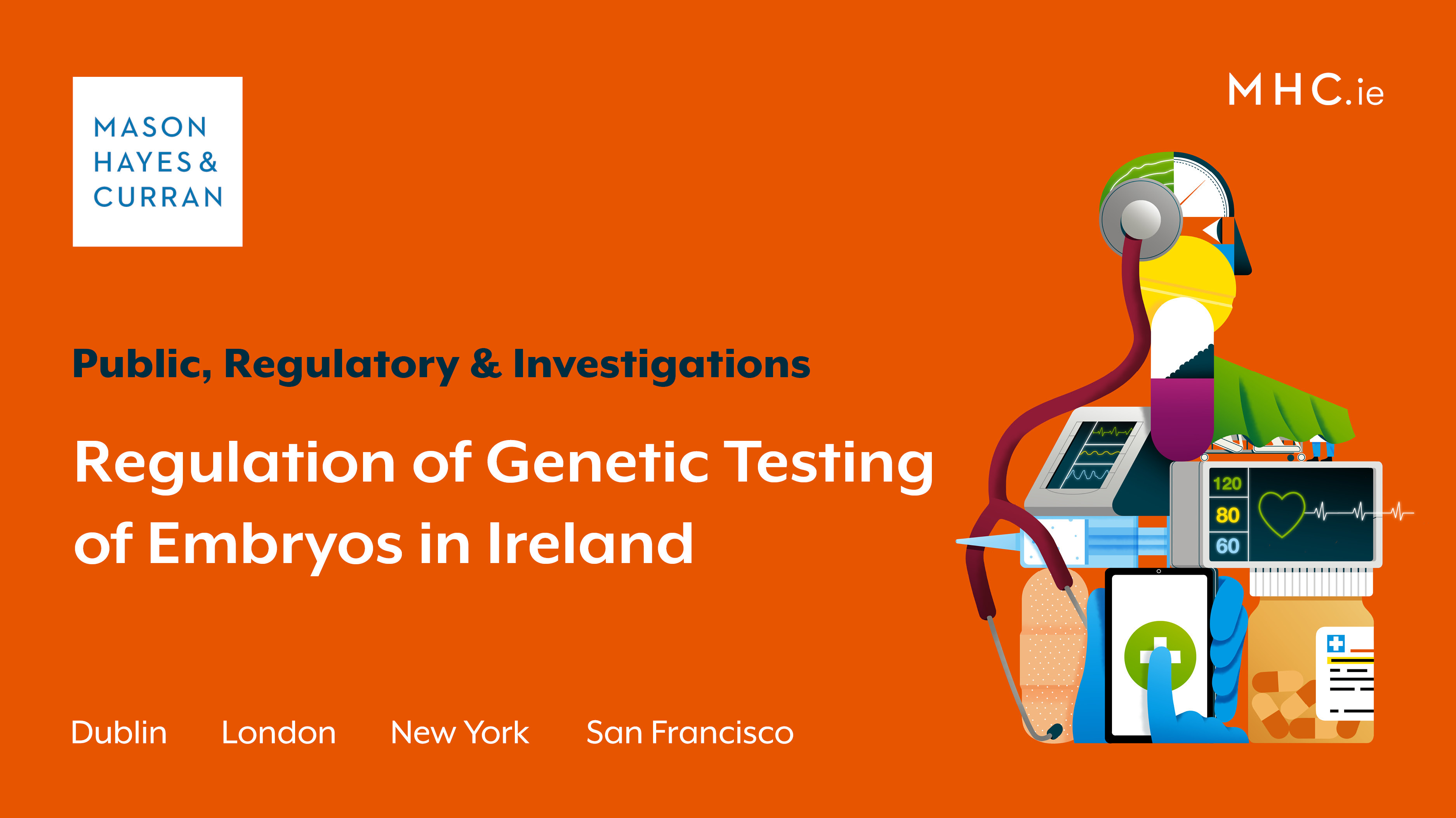
The long-awaited Health (Assisted Human Reproduction) Bill 2022 aims to provide legal clarity on assisted human reproduction practices in Ireland. Our Public Regulatory & Investigations team focuses on the Bill’s impact on pre-implantation genetic diagnosis and screening services in Ireland.
Assisted Human Reproduction (AHR) practices, including the provision of pre-implantation genetic diagnosis (PGD) and pre-implantation screening (PGS) services are unregulated in Ireland. The long-awaited Health (Assisted Human Reproduction) Bill 2022 will permit PGD and PGS services in certain prescribed scenarios.
What is PGD and PGS?
Both involve taking sample cells from an embryo, testing the genetics present in those cells, and selecting the most suitable embryo for transfer based on the results of the testing.
PGD services
Human Leukocyte Antigens matching
Human Leukocyte Antigens (HLA) matching, informally known as ‘saviour siblings’, arises where parents of a child with a life limiting condition, such as cancer, will conceive another child to provide stem cell treatment. The Bill permits the use of PGD to test and select an embryo for implantation in the womb. This practice is for the purpose of matching the tissue of the embryo with the tissue of the child who was born as a result of the AHR treatment with the tissue of the child with the existing condition.
There are limitations to the use of HLA however. This includes instances where there is no alternative treatment, on the basis of existing scientific and medical evidence, available to manage the relevant child’s life-limiting condition.
PGS services
The Bill states that PGS will be permitted for the purposes of testing an embryo for a chromosomal abnormality that may affect the likelihood of the embryo resulting in a live birth. This will be subject to a number of conditions, such as where the woman has a history of recurrent miscarriages.
The draft legislation seeks to limit the use of PGS to provide for sex selection in limited circumstances. These limited circumstances include scenarios where, in the opinion of a relevant specialist, there is a significant risk of a child being born with a genetic disease which has been listed on the Register and that disease affects only one sex or affects one sex significantly more than the other.
Assisted Human Reproduction Regulatory Authority (AHRRA)
It is intended that the AHRRA will be established to regulate all relevant practices. AHRRA’s principal function will be to protect, promote and ensure the health and well-being of children born or to be born by AHR treatment are preserved, insofar as is practicable. It will also cater for persons undergoing or about to undergo AHR treatment and intending parents.
AHRRA will have several other functions, including issuing licences to providers of AHR services and amending, revoking or suspending licences where required. Additionally, AHRRA will be responsible for establishing and maintaining the Register of Genetic Diseases. This is significant as providers will only be able to provide PGD services in cases involving those diseases on the Register.
Conclusion
The Health (Assisted Human Reproduction) Bill 2022 is currently at the third or ‘Committee Stage’ in the Dáil and it is therefore possible that further amendments will be made to the proposed legislation before it is ultimately enactment.
Now is a good opportunity to propose changes before the legislation is finalised. For more information on the ways to do this, contact a member of our Public, Regulatory & Investigations team.
The content of this article is provided for information purposes only and does not constitute legal or other advice.
People also ask
What is the Assisted Human Reproduction Bill? |
The Bill seeks to regulate practices used in assisted human reproduction. It will cover a range of practices including gamete donation, surrogacy and pre-implantation genetic testing. The Bill was initially introduced in 2017, and currently is at the Committee, or third stage of the process. |
Is preimplantation genetic testing or screening currently regulated in Ireland? |
No, as there is no regulation covering this area at the moment in Ireland. |
Can you donate embryos in Ireland? |
Embryo donation is currently unregulated in Ireland. |
Share this:






